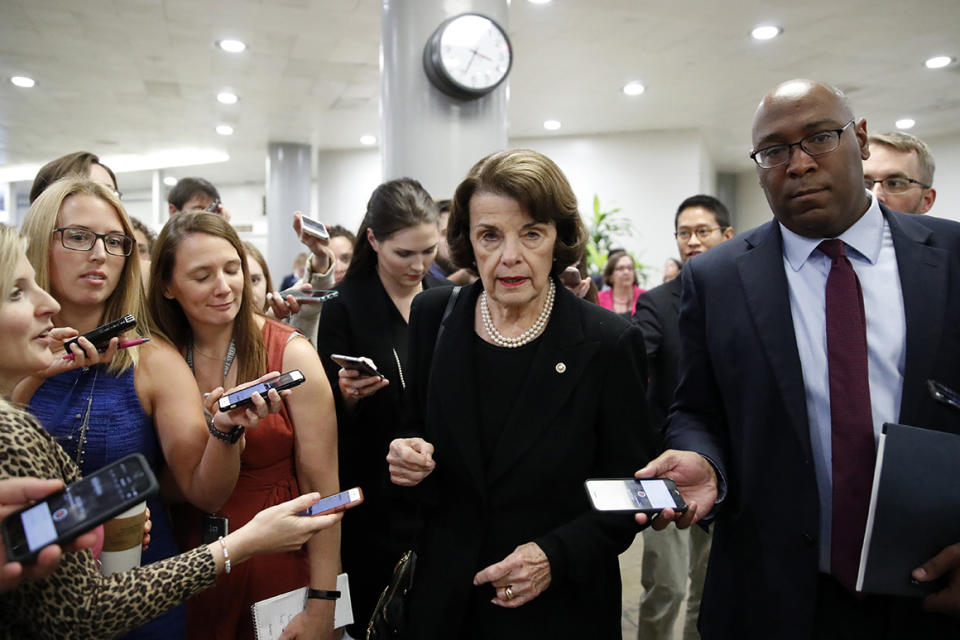Senate looks for holiday truce on impeachment trial
Senators are unlikely to let a little thing like impeachment ruin their holiday plans.
As soon as the House impeaches President Donald Trump, the Senate is, in theory, required to immediately begin a trial. But for a multitude of reasons, both strategic and mundane, senators say they are aiming to reach an agreement to take a breather and come back for the trial in January.
Despite bipartisan hopes of not letting impeachment drag on, no one in the Senate seems to want to sacrifice their Christmas or New Year’s. And though nothing has been finalized, senators expect party leaders who have sway on the matter to agree in the coming days.
“That’s the last thing we want to do is be here over Christmas,” Sen. John Cornyn (R-Texas) said. “I can’t imagine anyone will object. You never know for sure. It would be widely criticized by folks on both sides of the aisle, anybody who [fought it] and forced us to stay here.”
“Impeachment is a huge issue. And I don’t think we should rush into it,” Sen. Dianne Feinstein (D-Calif.) said. “We ought to find a way to wait till January, get through the holidays and then tackle it. I think to take it up before Christmas, a lot of bad things can happen, you move too fast — you don’t really hear it all.”

A delay might not be to everyone’s benefit. A person familiar with the White House’s thinking said the administration’s preference is to start the trial with no delay and it is actively seeking that result. And five Senate Democrats are still running for president; a trial starting in December would be less disruptive to their work campaigning in the early states, with the Iowa caucuses on Feb. 2.
But the Senate takes its scheduled breaks seriously and senators may need to rest up ahead of the grueling impeachment trial and its six-day workweek. Though many are busy when they are in their home states, senators are accustomed to something far more laid back when in Washington: Fly in on Monday afternoon and leave early Thursday afternoon.
And canceling a holiday recess for one of the most extraordinary events in the Senate’s history is not popular in any corner of the chamber. Plus there’s precedent for a delay: The Senate similarly postponed December action on former President Bill Clinton’s impeachment trial until January the next year.
Sen. Rand Paul (R-Ky.), who often takes lone positions that chafe his colleagues, signaled he is unlikely to spoil the holiday break. While he prefers the trial start “never,” he predicts it will begin in January.
“We don’t agree on a lot around here but that should be one thing we can agree on,” Senate Majority Whip John Thune (R-S.D.) said.
The House is on track to impeach Trump by the end of next week, but as of Monday afternoon, Senate Majority Leader Mitch McConnell (R-Ky.) and Minority Leader Chuck Schumer (D-N.Y.) still hadn’t sat down to discuss the timing and structure of a trial. And if they are eager to move the trial to January, they will have to form some sort of an agreement.
McConnell and Schumer have a few options. They could adjourn the chamber until January, stifling the House articles of impeachment from coming up immediately. They could strike an agreement requiring the unanimous consent of all senators on when to handle the trial. Or they could even start the trial and immediately vote at a simple majority threshold to resume it in January.
Pushing the trial back by even a few weeks might lead to a more civil discourse. The longer the Senate stays in town — particularly at the end of the year — the crankier senators get. It could also help everyone gear up for combat.
Both the accuser and the accused still have work to do and might benefit from the extra time. The House needs to select its managers and prepare its case that Trump abused the power of his office in his pressure campaign against Ukraine; the president has to plot his defense.
“The defense needs some time, too. In the previous impeachment trials, the defense wanted time to mount their case. And I imagine that will be the same again,” said Sen. Brian Schatz (D-Hawaii).
Of course, strange things happen in December as most senators eye the holiday exits and some see new points of leverage.
Aside from impeachment, Congress is trying to pass a raft of spending bills and a new North American trade deal over the next two weeks, and Sen. Joe Manchin (D-W.Va.) said he won’t consent to quick votes or quick passage of anything until he’s assured action on expiring pensions for miners.
“I’m just worried about the miners and the health care pension. That might keep us here with old Saint Nick. Everybody knows: I am not signing off on any [unanimous consent agreements] on anything. Nothing,” Manchin said.
Asked if he might use his leverage on impeachment, he replied: “I didn’t even think about that one.”
Marianne LeVine contributed to this report.

